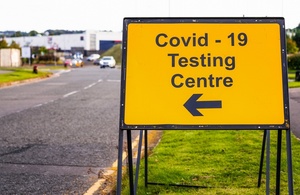Surge testing to be deployed in parts of west London
Additional coronavirus (COVID-19) PCR testing is to begin in the coming days in targeted settings and postcodes within Harrow, Ealing, Hillingdon and Brent.

Surge testing will start from today (Saturday 22 May) in some areas following the identification of confirmed cases of the B.1.617.2 variant, first identified in India. The cases have been instructed to self-isolate and their contacts are being identified.
Working in partnership with the local authorities, NHS Test and Trace is providing additional testing and genomic sequencing in education settings and targeted areas across the 4 boroughs. Testing will be deployed in different ways in each borough in order to meet local needs. Local authorities will shortly confirm the areas where additional testing will be offered in their boroughs, and reach out directly to residents to ensure people come forward for testing to stop the spread of the virus.
Everyone who lives, works or studies in the targeted areas and settings, including children, are being strongly encouraged to take a COVID-19 polymerase chain reaction (PCR) test, whether they are showing symptoms or not. By using PCR testing, positive results can be sent for genomic sequencing at specialist laboratories, helping us to identify variant of concern (VOC) cases and their spread.
If you have symptoms you should book a free test online or by phone so you can be tested at a testing site or have a testing kit sent to your home. If you have no symptoms, you should visit your local council’s website for more information.
In tandem with increased testing, enhanced contact tracing will be used for individuals testing positive with a VOC. This is where contact tracers look back over an extended period to determine the route of transmission.
People across the country are encouraged to take up the offer of twice-weekly free rapid testing, alongside the PCR test as part of surge testing.
The government and its scientific experts are monitoring the evolving situation and rates of variants closely, and will not hesitate to take additional action as necessary.
Appointments for a second COVID-19 vaccine dose will be brought forward from 12 to 8 weeks for the remaining people in the top 9 priority groups who have yet to receive their second dose. This is to ensure people across the UK have the strongest possible protection from the virus at an earlier opportunity.
The move follows updated advice from the independent experts at the Joint Committee on Vaccination and Immunisation (JCVI), which has considered the latest available evidence and has recommended reducing the dosing interval.